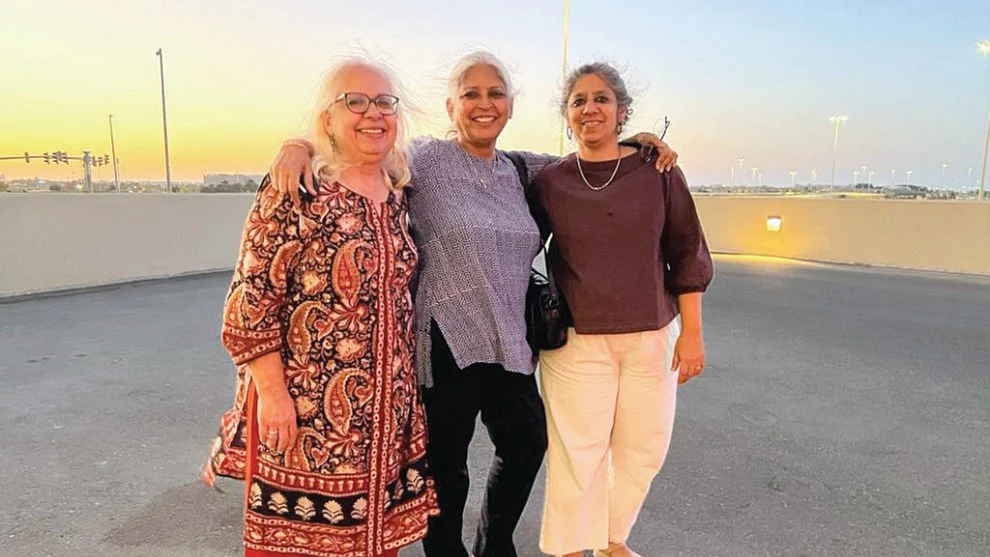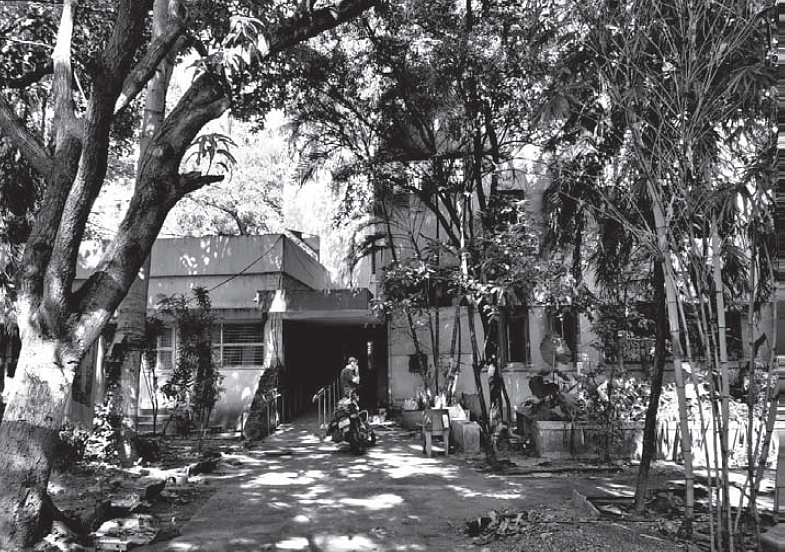‘A room of our own’
A collective memory project by FTII’s women graduates reclaims the narrative of their contribution to cinema

It all began in 2019 when Gloria Koshy, warden of the women’s hostel in the Film and Television Institute of India (FTII), Pune, created a WhatsApp group of ex-students, informing them that the building was about to be demolished. As messages flooded in, a “bag of illuminations burst open”.
On a campus largely dominated by male students, the women’s hostel was, for many of the female students, their first experience of a room they could call their own. “With that physical space vanishing, it felt urgent to archive what it meant to us…” filmmaker Surabhi Sharma (Direction, 1998) tells me. “A safe space, a place of privacy, where we could, away from family, build a relationship with cinema.”
That initial idea of recalling and recording the personal experiences of women graduates soon grew into something bigger. As conversations between alumnae zoomed out from the hostel to the campus, other stories emerged, not all of them rose-tinted. While FTII did afford them the luxury of making mistakes as they learnt their craft, it was not easy to negotiate. As student after student revealed, the campus was also a hotbed of “deep-seated misogyny”.
“There is a tradition of hostility to women students. Even now, women are told, Arre, you’ve taken a boy’s seat. Tum toh jaake shaadi kar loge,” says editor and documentary filmmaker Reena Mohan (Editing, 1982). FTII alumnae find, at best, a token mention in the dominant narratives about the institute. A coffee table book celebrating 60 years of FTII featured 32 graduates, of whom just five were women.
Speaking to the Quint about the findings of the Hema Committee—formed on the recommendations of the Women in Cinema Collective (WCC) to look into sexual harassment in the Malayalam film industry—that were made public on 19 August, Bina Paul (Editing, 1983), founder member of the WCC, pointed out that it’s not just women actors but ‘technicians’ and the entire female labour force that has to grapple with a regressive, repressive power structure. The FTII is no different, she says. “It is modelled on and made for a male-dominated industry, one that is becoming more and more inimical to women filmmakers.”
A woman who has fought her family to enter this industry is an important part of history, so why was she still being written out? That was the second provocation for the memory project, spearheaded by the three powerhouses I’m chatting with over coffee. To script a collective counter-narrative through individual testimonies, while asking larger questions about the nature of institutions that were part of nation-building.
They got a small grant and then, in 2020, the pandemic struck. What had been envisaged as a series of physical interviews morphed into Zoom conversations. A dozen FTII women graduates were asked to make ‘film poems’ about how the campus had shaped them, using whatever resources were at hand: photos, DV tapes, sound recordings. Four years, a second grant, 12 films and 54 interviews later, ‘A Room of Our Own’ has coalesced into a digital archive, a website that houses 21 of the interviews, along with a timeline of women in Indian cinema, seeded with the names of FTII alumnae whose contributions need to be acknowledged and remembered.
On 12 August 2024, the three curators offered contributors, alumni and friends a special preview of the project. The stated intention of “creating a feminist history of Indian cinema using feminist tools” might have sounded abstract, theoretical, if it weren’t for what leapt off the screen in that packed room at Harkat Studios, Mumbai. Layered and contradictory, the stories were moving, unsettling and sometimes funny.
Portraits emerged. Of the ‘behes karne vali ladki’, Chandita Mukherjee (1952–2023), the documentary filmmaker, perhaps best known for her series on science and technology, Bharat Ek Chhap, and whose audio-visual support for Forum Against Rape/ Forum Against Oppression of Women campaigns in the 1980s, along with Anjali Monteiro, was a critical part of her media activism. Of stereotyping in reverse, so that the uber-femininity of a Purva Naresh (Production, 1998) was reviled by other female students, even as she became the model for any student film that needed a sari-clad woman with long flowing tresses. Of a time when ‘erotica’ was an alien term, and one’s research led to late-night DD, which “spammed porn” into whatever programme was running. Of the Bodo girl, Pinky Brahma Choudhury (Direction, 1993), finding support and solace on campus after her father (Samar Brahma Choudhury, chairman of the Plain Tribals Council of Assam) and her brother were killed by All Bodo Students’ Union extremists in 1991. Of the Adivasi from Odisha, Lipika Singh Darai (2010) being told how surprising it was to see “an educated urban-looking tribal woman pursuing sound recording”. Of editors Fauzia Khan (1996) who “never liked rain in Dhaka”, but fell in love with the rain in Pune; and Khushboo Raj (2007) revelling in her newfound liberty—“I felt free. I didn’t have to adjust... It [the room] was mine. It was nice.” Of Prachee Bajania (Direction, 2019) being described as “wild and imaginary”.

The website (designed by Ambika Joshi and Nanditi Khilnani of Ajaibghar) might indeed be described as a ‘wild imaginary’— a series of interrogations and affirmations held together by the desire to reclaim the narrative, to tell their story as they see it. The latticed architecture of the site—consisting of recordings, videos, photo stories, prompts and pop-ups—has an exploratory feel, encouraging the visitor to follow a plot-line that grabs her interest, enabling her to co-create, as it were, the story that unfolds.
At the preview, women graduates of NID (National Institute of Design), Ahmedabad spoke of comparable experiences and scenarios on their campus, and the conversation opened out to how revealing—and instructive—it might be for other national institutes of design, architecture, management and technology to embark on a similar exercise. As Reena said, it’s not meant to be a resource of, by, for the FTII alone, but “rather an open-source, ever-evolving text that others might feel encouraged to broaden”.
Gloria, who sparked the whole thing off in 2019 with that WA group of hers, passed away in July 2021. The “fierce anchor who never policed” the girls in all her years as warden (1980–2012) speaks eloquently of another time. Is the room in the new women’s hostel still as precious to its occupants? Is the campus safer for being more policed? Yes and no, come the answers. It’ll be careless to assume that the young women students of today are safer in their new rooms with attached bathrooms—or inside their social media bubbles. Nor are they less affected by the crises that periodically haul FTII back into the headlines.
When Payal Kapadia (Direction, 2018) won India’s first Grand Prix Award at Cannes this year for her film, All We Imagine as Light, the same institute that had chargesheeted her, and other striking students in 2015, posted a glowing congratulatory message for her ‘glorious achievement’.
As Surabhi says, “The 2015 strike (against the appointment of actor-turned-politician Gajendra Chauhan as chairman of FTII and other members of the Governing Council who had little connection to cinema education) was on national TV on a daily basis. Until then, nobody really cared about the FTII protests. It was the first student protest that called out the saffronisation of educational institutions.
"At that point, if you remember, sentiments were being whipped up against the students of FTII, saying they took years to complete their diploma projects and leave the campus. The backlash was severe. They built on that backlash with JNU, Hyderabad University and Jadavpur University, which are also public-funded. All these places became suspect for ‘harbouring’ questioning minds. It’s not clear what the impact of all this is 10 years later, but we know there is impact.”
(‘A Room of Our Own’ is expected to be open to the public by end-2024)
Follow us on: Facebook, Twitter, Google News, Instagram
Join our official telegram channel (@nationalherald) and stay updated with the latest headlines
